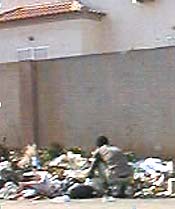Landing an elusive appointment, just take
a right at the abandoned minibus, a subject of suspicion
As I begin my research on Angola's oil industry, I have to
make a cultural adjustment.
The office at A-IP (Angolan Research Institute) is bustling
with incoming surveys. All of the computers are occupied by
staff carefully engaged in recording each response into a coded
system. Our Internet connection is not working. Without Internet
access or even a computer, I turn to the phone. Generally,
the numbers in the phone book are wrong. Or, in the case of
nongovernment organizations, they aren't even listed because
they can't afford the registration fee.
Verusca at the office has a friend with connections and she
gives me the correct number for the organization I'm seeking.
I call the organization and ask for the required contact. He/she
is in a meeting. I ask in stilted Portuguese to leave a message.
My name is a tricky one. How is it spelled? Okay, message taken.
The contact never returns my call. I call again and ask for
his/her cell phone number. Upon calling the cell number for
about the third time, the contact miraculously answers. I am
delighted! I ask to make an appointment. He/she says to call
back later next week. Only with persistence and patience do
I get an appointment.
 |

A young man scavenges in a
trash heap in a wealthy neighborhood
|
On the day of the appointment I wind through the streets,
looking for the landmark I've been given. I prefer addresses,
but it seems that no one uses them here. Instead I'm asked, "Do
you know Senhor da Costa's office?" or ambiguously told, "It
is near the gas station." Other times I'm given directions
such as "Take a right at the abandoned minibus and walk
down past the school toward the small park where people do
their washing. You'll see it from there." Worse yet,
once on the correct street, there is no guarantee that the
employees of an institution are aware of their neighbors. The
security guard at the National Bank does not know that the
Ministry of Petroleum is literally a few doors to the North.
He suggests that I walk in the opposite direction. After a
few blocks, I double back, waving to him as I pass.
The city of Luanda is fairly large and I have to space my
appointments by gauging how long each will last and how far
I will need to walk. It can take me up to an hour to walk from
one appointment to the next – a sweaty proposition in
the midday sun. Some interviews go well, others are painful.
Sometimes the interviewee is patient with my basic Portuguese
and other times he/she will prefer to carry on in English.
The setting may be a relaxed café or an air-conditioned
high rise. Some interviewees are suspicious that I may be a
reporter interested in exposing some dreadful topic, while
others have sympathy for my endeavor based upon their own graduate
research experiences. At the end of the appointment I am given
a few more names and the process begins again.
Outside of this formal meeting process are the expatriate
clubs. Here, I learn a great deal, but I cannot take copious
notes, as I might be able to do in an office setting. Taking
notes at a bar is considered a bit sketchy. Instead, I must
listen and try to commit the important points to memory over
a few glasses of wine (not drinking at a bar is also considered
a bit sketchy). This proves to be a difficult task!
— Kristin

